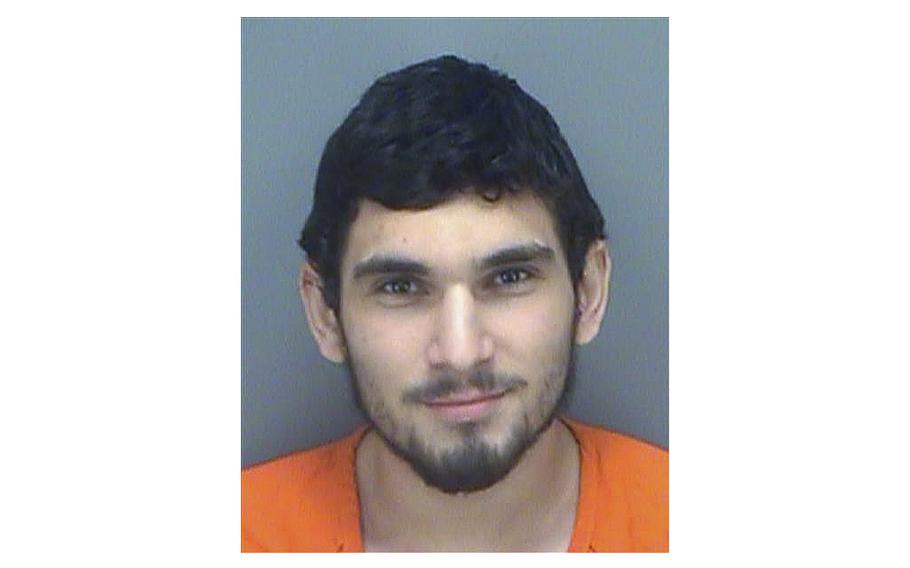
Muhammed Momtaz Alazhari as seen in a police mug shot. (Pinellas County Sheriff’s Office)
TAMPA (Tribune News Service) — The Tampa man accused of plotting an attack in the name of the Islamic State has agreed to plead guilty to a terrorism charge and accept an 18-year prison sentence, according to a plea document filed this week in federal court.
Muhammed Alazhari, 25, signed an agreement Monday that calls for him to plead guilty to a single charge of attempting to provide material support and resources to a foreign terrorist organization. Two other criminal charges, related to a pair of guns he was alleged to have illegally possessed, will be dismissed.
If a judge approves the guilty plea, it will abruptly end a case that for more than two years has seen intense and complex litigation of issues related to government surveillance, searches and the defendant’s mental health.
Prosecutors and the defense sparred over information related to the Foreign Intelligence Surveillance Act, a federal law that governs evidence collected in espionage or international terrorism investigations.
Some court documents filed in the case are labeled “highly sensitive,” a designation that keeps records out of the public view when they contain confidential information that could relate to national security, foreign relations or cybersecurity.
Alazhari, who is an American citizen born in California, spent most of his life overseas and “came to embrace” extreme Islamist beliefs, according to the plea agreement. In 2015, he was imprisoned in Saudi Arabia for supporting Jaysh al-Islam, a rebel group involved in the Syrian war. He spent three years in custody there before he was sent back to the U.S.
Not long after his return, he caught the attention of the FBI, which began investigating suspicions that he might be providing support to a foreign terrorist organization, according to the agreement.
In the spring of 2020, prosecutors said, he began planning an attack in support of ISIS, the militant organization also known as the Islamic State of Iraq and the Levant.
In preparation, he gathered weapons and began scouting potential targets in Tampa Bay, the agreement states. He consumed ISIS propaganda, spoke favorably of the terrorist group and took an oath of allegiance to them.
He spoke of vengeance for imprisonment of Muslims, including ISIS fighters, and for American military actions in the Middle East, the agreement states. Alazhari rehearsed parts of his plan, practicing statements he would make during his attack.
While under surveillance, Alazhari interacted with an undercover FBI agent and another person that the plea agreement identifies as a “confidential human source.” He tried to buy guns from the undercover agent, but was arrested on an unrelated state firearms charge while negotiating the purchase.
Not long thereafter, he met with the confidential source, tried to convert that person to Islam, confided his affiliation with ISIS and described his plans to support the group, the agreement states. He asked the source to help him obtain weapons and to commit robberies, according to the agreement.
When he was arrested in May 2020, federal agents had been watching Alazhari for weeks. Their use of what his defense attorneys would describe as a “secret spy plane surveillance program” in monitoring his movements became a subject of legal challenges.
Court records tell of a fleet of small airplanes owned by the FBI, but registered to fictitious front companies and used to conduct covert surveillance. The planes have high-tech video cameras affixed to their undersides, which are used to zoom in on people and places as the aircraft circle at high altitude.
The government collected more than 900 aerial surveillance videos of Alazhari, recording him as he got his mail, visited his sister and checked in at a mental health clinic. They also recorded his trips to Honeymoon Island State Park and Orlando, where the government said he was scoping out locations for an attack.
The defense challenged the legality of the aerial surveillance. At the same time, the government disputed that there was a “spy plane” program and offered to have pilots testify about the planes. But the legal issue remained unresolved.
Also unresolved was a challenge to the FBI’s search of Alazhari’s apartment, which they accessed after his sister got in and opened it up for them.
Alazhari was at one point deemed mentally incompetent to proceed in court and spent time undergoing mental health treatment.
His plea agreement will not be final until after a change-of-plea hearing, which is set for next week.
©2023 Tampa Bay Times.
Visit tampabay.com.
Distributed by Tribune Content Agency, LLC.